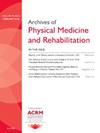Rehabilitation Researchers Learning Health Systems Needs Assessment Survey: A Follow-up Assessment of Research Competencies
IF 3.6
2区 医学
Q1 REHABILITATION
Archives of physical medicine and rehabilitation
Pub Date : 2025-04-01
DOI:10.1016/j.apmr.2025.01.022
引用次数: 0
Abstract
Objectives
To conduct a follow-up survey to identify interest and knowledge in learning health system (LHS) competencies among rehabilitation professionals. This survey included all items from the first survey wave (dates) and additional items related to health and health care equity and justice.
Design
A cross-sectional Rehabilitation Researchers Learning Health Systems Needs Assessment Survey was fielded by the Learning Health Systems Rehabilitation Research Network.
Setting
Not applicable.
Participants
The survey was disseminated through a listserv of Learning Health Systems Rehabilitation Research Network subscribers and researchers at Tier 1 universities and departments, rehabilitation professional organizations, newsletters, and social media to recruit rehabilitation professionals from varied fields.
Interventions
Not applicable.
Main Outcome Measures
The survey included 70 items, organized by LHS domain, which were based on the core competencies developed by the Agency for Healthcare Research and Quality. The main outcomes were ratings of knowledge and interest (none, some, or a lot) for each LHS competency item. The survey also assessed the respondent's professional and demographic characteristics.
Results
The sample included 637 participants who responded to at least one competency item or at least one demographic question. Most were women (75.4%), white (67.4%), and non-Hispanic (90.6%). Respondents were from varied professions including physical therapy (24.5%), research (21.6%), behavioral health (17.6%), and others. The top 10 items with the highest proportion of respondents indicating “a lot” of interest included items from the health and health care equity and justice, research methods, systems science, improvement and implementation science, informatics, and research questions and standards domains. The top 10 items with the highest proportion of individuals indicating “none” or “some” knowledge included items from the system science, engagement, leadership, and research management, informatics, and health and health care equity and justice domains. Competency items that were of high interest and low knowledge were related to designing studies, selecting outcome measures, and implementing research evidence into health systems. Also, promoting implementation of evidence-based care into routine practice, using approaches to foster engagement and to implement findings across settings to advance equity and justice in health and health care delivery were of high interest and low knowledge.
Conclusions
We found that rehabilitation professionals had a lot of interest in health and health care equity and justice competency items and limited knowledge related to systems science competency items. The results of the survey can be used by LHS training programs to identify areas to target learning opportunities to work toward achieving proficiency in LHS competencies among rehabilitation researchers.
Disclosures
none.
求助全文
约1分钟内获得全文
求助全文
来源期刊
CiteScore
6.20
自引率
4.70%
发文量
495
审稿时长
38 days
期刊介绍:
The Archives of Physical Medicine and Rehabilitation publishes original, peer-reviewed research and clinical reports on important trends and developments in physical medicine and rehabilitation and related fields. This international journal brings researchers and clinicians authoritative information on the therapeutic utilization of physical, behavioral and pharmaceutical agents in providing comprehensive care for individuals with chronic illness and disabilities.
Archives began publication in 1920, publishes monthly, and is the official journal of the American Congress of Rehabilitation Medicine. Its papers are cited more often than any other rehabilitation journal.

 求助内容:
求助内容: 应助结果提醒方式:
应助结果提醒方式:


